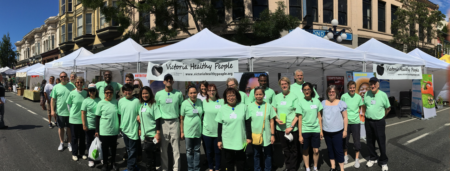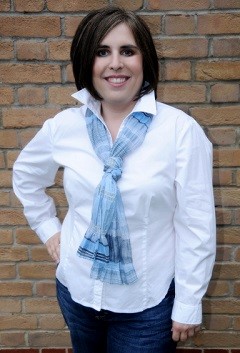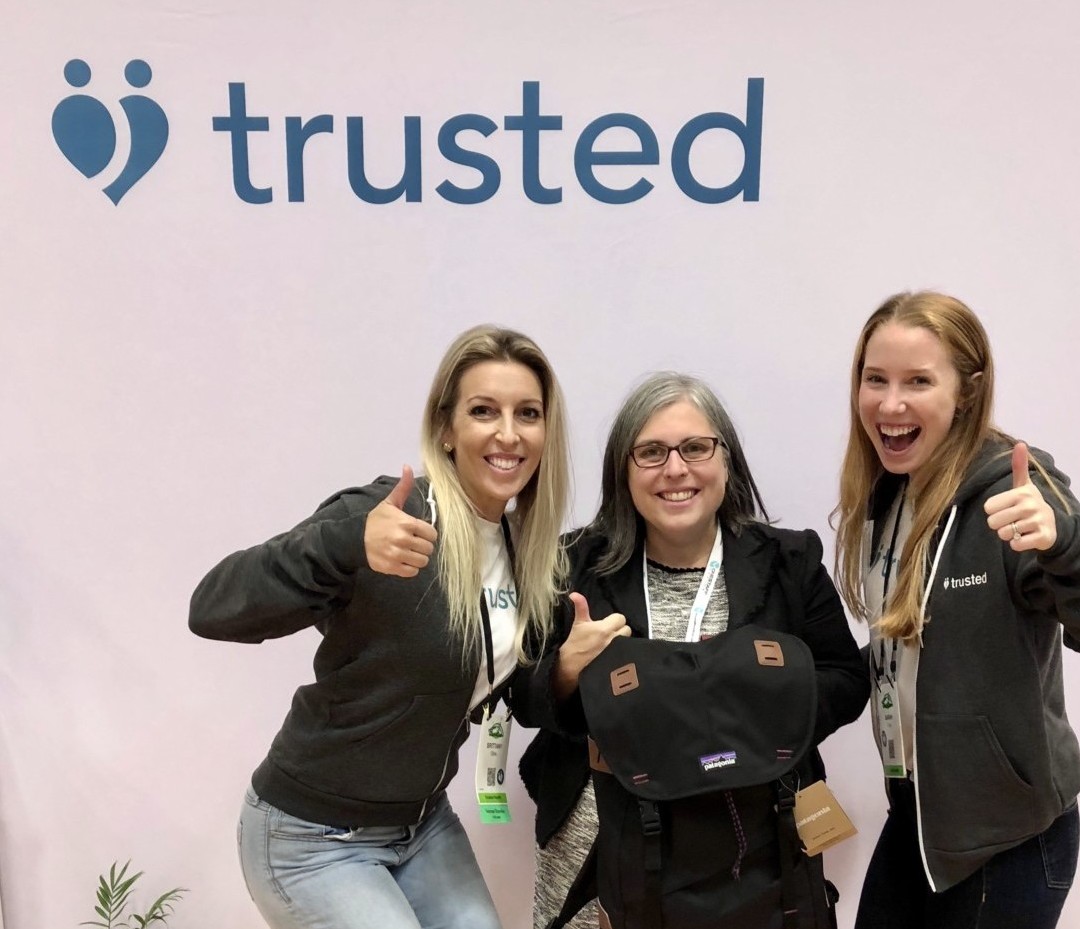Heidi is a Mother-Baby nurse and works on-call in Victoria, BC and on short-term assignments throughout the U.S. Sixteen years after earning her BSN, she received a Masters in Business Administration and Healthcare Management. As you’ll discover, she is passionate about promoting scientifically backed and evidence based health education, which she does through her role on the Workplace Culture Council for Island Health and Victoria Healthy People, a volunteer-led nonprofit she founded three years ago.
We had the privilege of meeting Heidi at TravCon and were excited to dive deeper into this passion.
How is chronic disease so prevalent and becoming even more so at younger ages? At what point should we be integrating this education?
Chronic diseases are becoming even more prevalent at younger ages due to rising obesity rates that are driven by lack of exercise, increased consumption of processed food, dairy and animal products. The World Health Organization (WHO) recognizes obesity as a driving force of chronic diseases such as diabetes, cardiovascular disease, stroke and cancer. In 2016, WHO announced that red meat and processed meat cause cancer and are type 1 carcinogens. Whole food, plant-based diets have proven to reverse Type 2 diabetes, cardiovascular and cancer successfully. Dr. T. Collin Campbell found that rats in a lab with tumors had accelerated tumor growth when fed casein and when the intake was decreased, the tumors shrank (Forks Over Knives Movie). Dr. Caldwell Esselstyn was able to save the lives of 24 participants in a study that were terminal and given less than 6 months to live due to their severe cardiovascular disease. On a whole food, plant based diet (WFPB) they not only lived longer, but also reversed their disease process.
Educating children in elementary school (ages 5-12), as well as parents, in weekly health and lifestyle classes for parents is a great place to start. There is so much to be done globally as diabetes and obesity has been declared pandemic by WHO and is a global public health concern. Education truly is needed in communities for all ages presently. Health care professionals are in dire need of education as well.

As an acute care nurse with a similar passion for health, wellness, and education, I would often get frustrated with some medical interventions that didn’t align with chronic wellness. Do you experience this as well?
Coming from a family of health care professionals that have a long history of health education, promotion and community public health volunteer work, I meet many people that have not heard or read the latest science and are promoting heavy protein diets, for example. Rather than becoming frustrated, I view this as an opportunity to ask them what they know about the scientifically backed and evidence research that is showing WFPB diets prevent and reverse disease, along with exercise, water, rest / sleep, etc. I frequently recommend people watch the movie Forks Over Knives.
What does it mean to you to be healthy? How do you practice what you preach?
Health=Wholeness. The best acronym to describe my approach and practice of holistic health is: NEWSTART.
Nutrition–WFPB (whole food plant based diet and I gave up oil this year!) with two meals per day 8am and 2pm
Exercise–goal of walking 5-10 miles/day
Water–2-3 litres per day
Sunshine–while I exercise
Temperance–Abstain from mind altering substances, caffeinated teas, coffee, drugs, alcohol.
Air=window open at night, fresh air while exercising
Rest–7-8 hours sleep per night
Trust in God–reading my Bible, daily prayer and being part of a faith based community.
Have you noticed differences between nursing in Canada and the U.S. in terms of one taking more of a holistic approach?
In both countries, I find people very open to learning about health and wellness. In 2018, the global trend is Veganism!
Physicians get zero hours of nutrition education in medical school.
Canada’s new food guide due out this year will actually be ahead of the USA when it comes to promoting a WFPB diet. More holistic private clinics are becoming popular in British Columbia and other areas of Canada and even some mainstream physicians–such as endrocrinologists are promoting WFPB diets to their patients to reverse type 2 diabetes right here in my home town of Victoria, BC. Doctors of BC has a “Walk with your Doc” program that some doctors (my father and I team up–doctor and nurse) year round to provide in our area. We also are going into two elementary schools on October 1 and 22 to promote the “Be Active” campaign to nearly 400 students with the Doctors of BC (which highlights 5-2-1-0). Five fruits and veggies per day, 2 hours or less screen time, 1 hour physical exercise and zero sugary drinks. As a nation, Canadians like Americans are still slow to learn and many health care professionals are stuck with what they learned in advertisements. Physicians get zero hours of nutrition education in medical school. On a positive note, Canada actually helped Brazil develop their food guide and diabetes prevention campaign a few years ago. As a nation, some knowledge is there, it just takes time to catch up with lobbies fighting hard to keep meat and dairy front and centre.
So in some ways, we [Canada] may be a bit ahead. From an educational perspective, there is a significant movement in the USA by PCRM–Physicians Committee for Responsible Medicine, PlantPure Nation, Healing America, Forks Over Knives and others to educate the public about the health benefits of WFPB diet as well as the environmental damage being caused globally by the high consumption of animal products and animals. An excellent movie just released this year “H.O.P.E. What You Eat Matters” is highly educational on all fronts and free to view on YouTube.
It sounds like your parents had an influence on you at an early age. How did you harness this passion and what did you do as an acute care nurse to make small differences in the lives of your patients?
My father is a family physician with a Masters in Public Health and my mother was a nurse, educator and also has a Master in Public Health. My earliest recollections as a child about the age of 6 years is of my parents teaching the “5 Day Plan to Stop Smoking” and Vegetarian Cooking Classes. As a teenager, I spent a summer working in this very Health Education Centre that was sponsored by my father and his cousin (also a physician). Twelve years ago, my mother became disabled due to a medical error. My parents had been active volunteer health educators in the community for 40 years outside of their full time jobs. The losses for my mother were so great as she requires a 24/7 assistance and we decided that with her long term memory intact, she could still help educate. The challenge was my father could not organize events, so I took on the challenge. We began Victoria Healthy People in May of 2015 and together we continue to educate the community in elementary schools, WFPB Cooking Workshops, Dinner with the Doctor, Walk with your Doc, movie screenings, label reading classes at the grocery store, Diabetes Undone, Depression and Anxiety Recovery Programs and even a Canadian Federal Prison where we go monthly. We recently became a non-profit and are working towards our charitable status in Canada.
When I’m working with acute care patients, I bring up nutrition, diet, exercise, water, rest etc. As a mother-baby nurse at present (although I’ve worked in almost every area of the hospital in my career), whole person health is important not only for the new parents but also for the baby. Daily, I look for opportunities to talk with peers and anyone I meet. Public health is truly about sharing the news with everyone and getting the word out. There are many simple things that can be shared that will help people stay well and live better lives. For example, 1 tsp of sugar depresses the white blood cells for hours, making us more susceptible to viruses and bacterial infections. A 3 minute very hot shower followed by a 30 second ice cold shower done in a cycle of 3 will boost the immune system and help fight off illness. And finally, when feeling the onset of a sore through, hydrate with water, get lots of extra sleep, eat veggies and fruits, skip the sugar added foods and wrap a warm wet cotton handkerchief around your neck, cover with a wool sock and pin with a large safety diaper pin. The sore throat will usually be gone in the morning.
Most people don’t truly understand what ‘public health’ means or entails. What does it mean to you?
Public health is the overall health of the population or otherwise termed population health. As a nation, the USA is getting sicker and sicker. Canada is healthier than the USA, but declining as well. Just take a peek at the global obesity maps and global diabetes maps to grasp the pandemic that is upon our world. To me, public health education is sharing scientifically backed, evidence based health education and promotion of a lifestyle that will not only prevent, but can reverse chronic diseases. Dr. Michael Gregor points out from scientific literature that up to 90 percent of chronic diseases and WFPB can prevent cancer. Latest research shows that various types of cancer risks can be reduced from 20-90% by following a whole food, plant based diet and exercise / lifestyle choices.
If that isn’t convincing, I don’t know what is! Gold medalists and olympic champions are turning to WFPB diets for strength and endurance as well.
How do you think we as nurses can chip away at the major health concerns that are plaguing our country?
This is important, as what a nurse says, a patient might even believe over a physician according to studies. So when it comes to major health concerns, nurses have a duty to get educated on the latest evidence based science.
Nurses are a major influence and have the potential to shift the health of nations globally. In polls, nurses are voted as being the one of the top most trusted professions. This is important, as what a nurse says, a patient might even believe over a physician according to studies. So when it comes to major health concerns, nurses have a duty to get educated on the latest evidence based science. As a nurse, spend time every year attending health and nutrition conferences to continue to update on the latest scientific studies. P-POD.org–Plant based Prevention of Disease Conference in May is inexpensive and excellent. Every 5 years, there is an International Congress on Vegetarian Nutrition at Loma Linda, CA–the next one will be in 2023. Nurses can start from the comfort of their homes by reading “The China Study” by Dr. T. Collin Campbell and watching a few movies and putting into practice what they learn. Here are a few excellent movies to start the journey: Forks Over Knives, The Marshall Plan, What the Health, Eating You Alive, H.O.P.E. What You Eat Matters, Genetic Roulette: The Gamble of Our Lives and Cowspiracy. New movies coming this Fall and Winter are: “Secret Ingredients“and “Code Blue.”

- Healthiest habit for work days: Get plenty of rest before and after night shift.
- My work mornings usually start with…2 large glasses (24-32oz total) of pure water upon rising
- Go-to meal that I pack for work: Pack my cup of beans along with my whole food plant-based meal and make sure to stay hydrated at work.
- Favorite thing to do on a day-off: That’s a toss-up between traveling the globe and sharing health principles with people.
- Favorite app: HappyCow (find vegan restaurants and health food stores around the globe)
- Clogs or sneakers? Danskos for work! Good walking shoes (Merrells usually) for my walks!
- If I wasn’t a nurse, I would probably be..a doctor, but honestly, I’m happy with my life and role and educating others, seeing their lives transformed is so rewarding.
- Compression stockings, compression socks, or neither? Neither
- Puke, poop, sputum, IV starts in babies, we’ve all got our aversion, what’s yours? Sputum
- Go-to choice of caffeine? None. I’m plant powered and high energy!

















